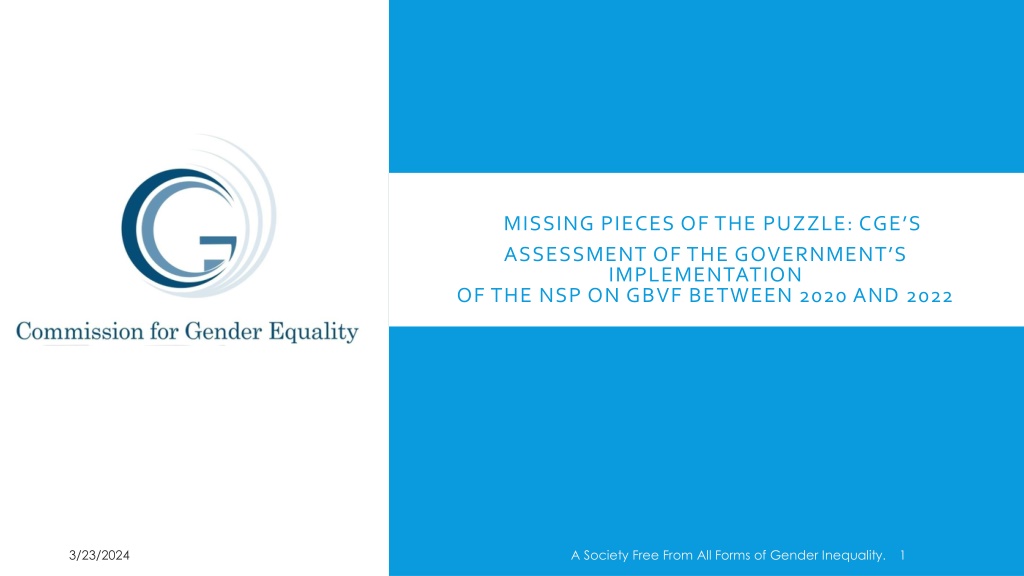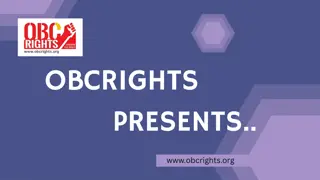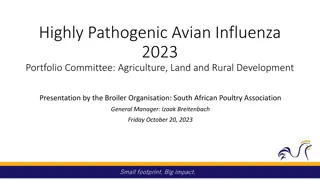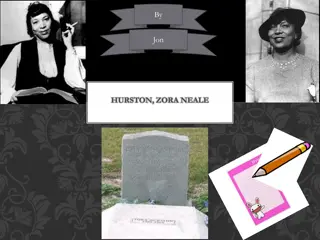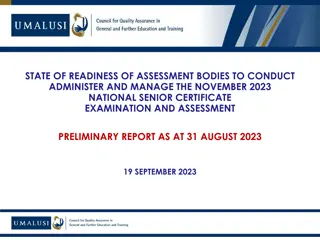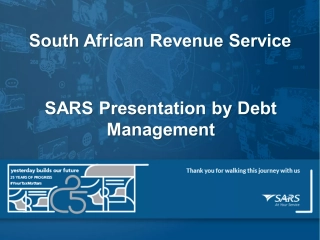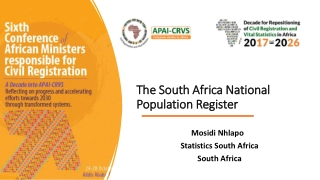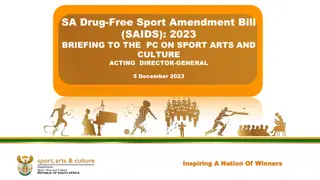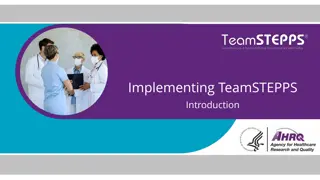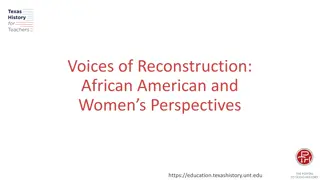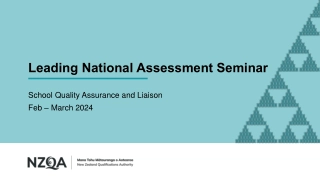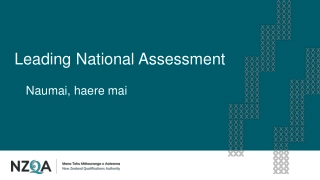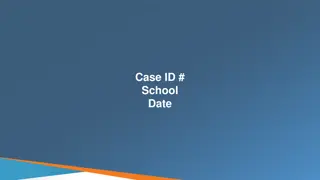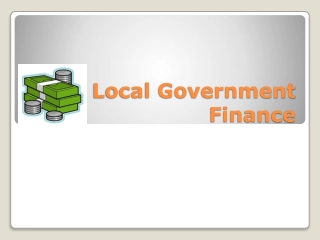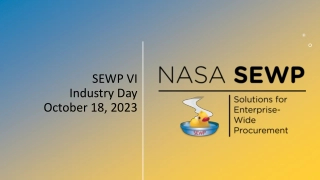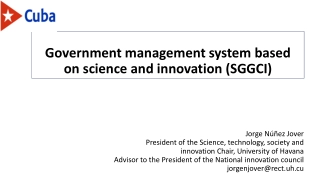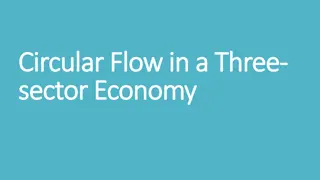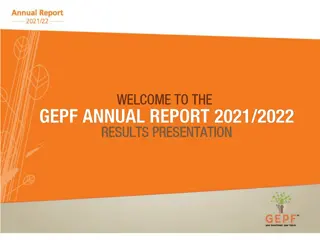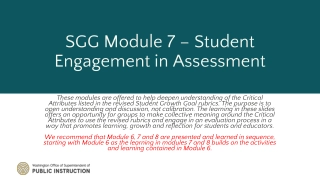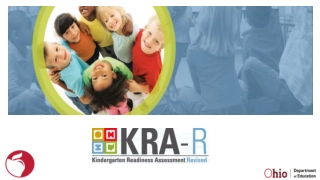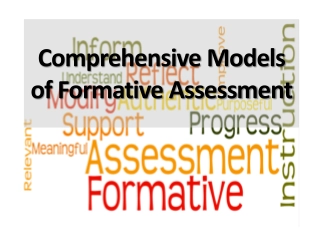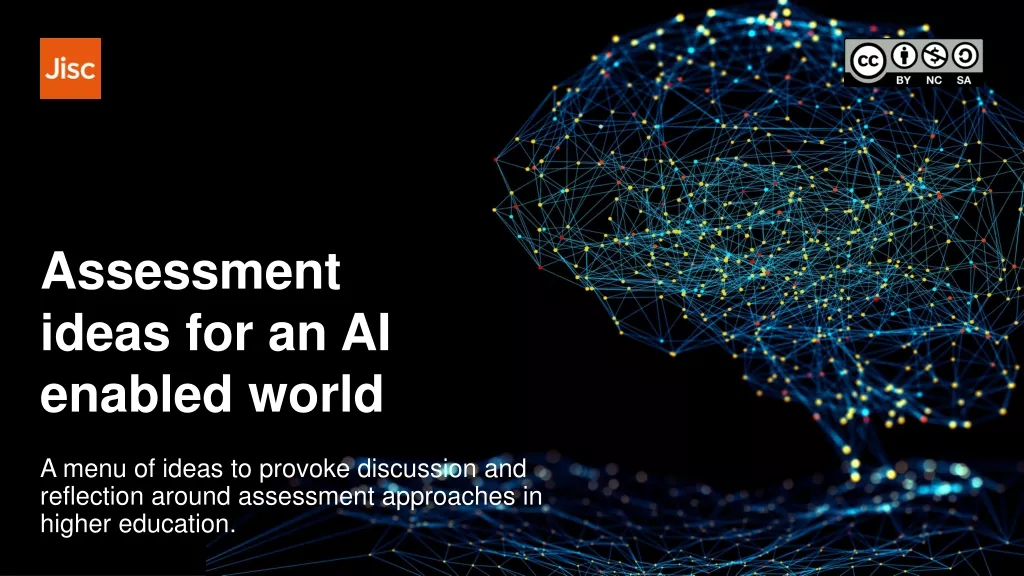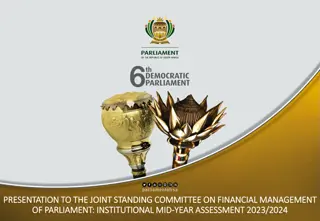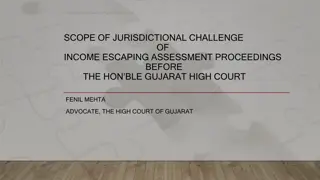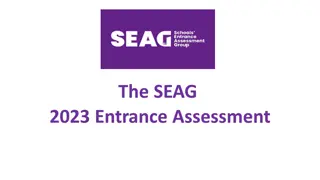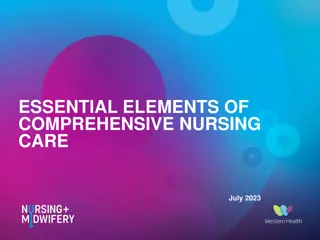Assessment of South African Government's Implementation of NSP on GBVF
The Commission for Gender Equality (CGE) assessed the government's implementation of the National Strategic Plan on Gender-Based Violence and Femicide (NSP on GBVF) between 2020 and 2022. The study aimed to review policies and practices to promote gender equality and women's rights. The NSP provides a strategic framework to address GBVF, developed through a consultative process involving various stakeholders. Data was collected from government entities and state-funded organizations for a period of two years.
Assessment of South African Government's Implementation of NSP on GBVF
PowerPoint presentation about 'Assessment of South African Government's Implementation of NSP on GBVF'. This presentation describes the topic on The Commission for Gender Equality (CGE) assessed the government's implementation of the National Strategic Plan on Gender-Based Violence and Femicide (NSP on GBVF) between 2020 and 2022. The study aimed to review policies and practices to promote gender equality and women's rights. The NSP provides a strategic framework to address GBVF, developed through a consultative process involving various stakeholders. Data was collected from government entities and state-funded organizations for a period of two years.. Download this presentation absolutely free.
Presentation Transcript
MISSING PIECES OF THE PUZZLE: CGES ASSESSMENT OF THE GOVERNMENT S IMPLEMENTATION OF THE NSP ON GBVF BETWEEN 2020 AND 2022 3/23/2024 A Society Free From All Forms of Gender Inequality. 1
CGE MANDATE The Commission for Gender Equality (CGE) is an independent statutory body established in terms of section 187 of the Constitution of South Africa. The Commission is mandated to promote respect for gender equality and the protection, development, and attainment of gender equality in the Republic. The powers and functions of the CGE are outlined in the Commission for Gender Equality Act No. 39 of 1996. Specifically, in terms of section 11(1)(a) of the CGE Act, the CGE has the mandate to monitor and evaluate policies and practices of state organs, state agencies, public bodies and the private sector in order to promote gender equality and the rights of women, and to prepare and submit reports to Parliament. 2 A Society Free From All Forms of Gender Inequality. 2024/03/23
MAIN OBJECTIVE OF THE STUDY The purpose of the study was to review the implementation of the National Strategic Plan on Gender- Based Violence and Femicide (NSP on GBVF) by the South African government and other state-funded entities between the 2020/2021 and 2021/2022 financial years. These were the first two years of the NSP implementation since it was formally adopted in April 2020. The NSP is one of the outcomes of the Presidential Summit Declaration that emanates from the November 2018 Presidential Summit on GBVF. 3 A Society Free From All Forms of Gender Inequality. 2024/03/23
BACKGROUND The NSP provides a multi-sectoral, coherent strategic policy and programming framework to strengthen a coordinated national response to the scourge of GBVF by the government of South Africa, as well as the country as a whole. The strategy has a ten-year life cycle (2020 to 2030) and was developed in 2019 through a comprehensive consultation process led by the Interim Steering Committee (ISC) on GBVF. The ISC comprised various stakeholders, including government departments, members of civil society organisations (CSOs), development partners, academics, and other role-players. 4 A Society Free From All Forms of Gender Inequality. 2024/03/23
METHODOLOGY 1 2 3 4 5 The project aimed to monitor and review the implementation of the NSP on GBVF by the South African government departments and state funded entities between the 2020/2021 and 2021/2022 financial years, which were the first two years of NSP implementation. The project had a timeline of 12 months. Data was gathered from government departments and other state funded entities through written submissions to the CGE. The CGE had written to these institutions based on their responsibilities as delineated in the NSP document regarding the implementation of the six pillars of the NSP. Data was also gathered through desktop research from various official sources such as departmental reports, annual planning documents, annual reports, and published and unpublished documents. 5 A Society Free From All Forms of Gender Inequality. 2024/03/23
LIMITATIONS OF THE STUDY It is always important to indicate the limitations of the study as they may affect validity, reliability and trustworthiness of data that informs the study. Firstly, this study relied heavily on the cooperation of the many lead and support government departments assigned tasks and responsibilities in the NSP. Unfortunately, the CGE research unit received very limited responses from the government departments, who were in a position to offer updated progress information regarding the work done in terms of the implementation of the NSP. Secondly, some government departments that responded to the CGE s request for information took longer than expected to send information, with some departments sending information that was scanty and sometimes inconsistent with what was being requested by the CGE. Thirdly, most of the NSP targets must be achieved annually from 2020 to 2024, which proved challenging during the review as CGE researchers were not privy to the implementing departments yearly targets/milestones. This made it difficult for the CGE research team to determine whether those yearly targets were achieved within the targeted 2 financial years or not. 6 A Society Free From All Forms of Gender Inequality. 2024/03/23
BROAD OVERVIEW OF FINDINGS Pillar Totals Targets falling between 2020 - 2022 Progress of implementation (2020- 2024) No performance information Total Achieved Not Achieved Progress Detected No Progress Pillar 1 1 4 8 1 11 25 Pillar 2 8 1 22 0 10 41 Pillar 3 0 0 18 3 5 26 Pillar 4 1 0 9 4 4 18 Pillar 5 1 0 8 7 6 22 Pillar 6 0 0 7 3 2 12 Totals 11 5 72 A Society Free From All Forms of Gender Inequality. 18 38 144 7 2024/03/23
FINDINGS The findings demonstrate that out of the 144 indicators, 11 that were targeted for completion within the 2020 and 2022 financial years were achieved. This category also incorporated indicators that were meant to be achieved quarterly and bi-annually within the indicated periods. 5 of the indicators falling within this category (2020 2022) were unachieved at the end of 2022. 75 indicators with a roll-out period of five years (2020 2024) had some form of progress detected in their implementation. The level of progress varies across the indicators as discussed in the different sections regarding the pillars. The was no progress detected on 15 indicators in relation to NSP implementation during the period under review. The last category focused on indicators whereby performance information could not be obtained. 38 of the 144 indicators fall within this category. 8 A Society Free From All Forms of Gender Inequality. 2024/03/23
PILLAR 1 : ACCOUNTABILITY, COORDINATION AND LEADERSHIP The findings demonstrate that the NCGBV as the accountability, coordination and leadership structure was not established during the first two financial years of rolling out the implementation of the NSP. This was due to delays in the promulgation of legislation that gives existence to the structure. The delay in the establishment of the structure has hampered progress on many indicators, particularly those wherein the NCGBVF was assigned the lead role in the NSP. The nonexistence of the NCGBVF also created an institutional vacuum on the overall oversight and monitoring of the NSP, given the gaps in data and information on the implementation of various key activities that were supposed to have been achieved during the years under review. The CGE could thus not assess key achievements and shortcomings under this key activity of putting mechanisms and processes in place to hold state and societal leadership accountable for taking a firm stand against GBV. Overall, the performance assessment under Pillar 1 revealed that advancements had been made to achieve some of the target indicators. 9 A Society Free From All Forms of Gender Inequality. 2024/03/23
PILLAR 2 : PREVENTION AND REBUILDING SOCIAL COHESION Strides have been made on several areas in Pillar 2, such as developing the Comprehensive National GBVF Prevention Strategy. The strategy is comprehensive, taking on a whole-of-society approach to addressing the root causes of GBVF. The strategy adopts a systematic approach and emphasizes the value of policy and evidence in driving an evidence- informed GBVF prevention strategy in the country. Other areas where progress was noted are as follows: Development of the National Integrated Prevention Strategy against Femicide Approval of the policy framework to address GBV in the post school education and training (PSET) system Many communication interventions implemented. Regrettably, information could not be obtained on implementing several indicators, while progress could not be noted in some. 10 A Society Free From All Forms of Gender Inequality. 2024/03/23
PILLAR 3 : PROTECTION, SAFETY AND JUSTICE Progress on the development of respective legislations was noted during the first two years of the implementation of Pillar 3 including: The amendment of Chapter 6 of the Criminal Law (Sexual Offences and Related Matters) Amendment Act 2007, The overhaul of the Criminal Procedure Act of 1977. The amendment of the Labour Relations Action. The finalisation of the Traditional Courts Bill. The inclusion of cyber violence in the Cybercrimes Bill, which were all before Parliament for promulgation at the end of the review period. The President signed three Bills into law, i.e., Criminal and Related Matters Amendment Act 12 of 2021, Criminal Law (Sexual Offences and Related Matters) Amendment Act 13 of 2021, and Domestic Violence Amendment Act 14 of 2021. The signing of these laws is a significant milestone for survivors of GBV in the criminal justice system. The amendment of the Customary Marriages Act has become law, and the Regulations for Sexual Offences Courts was finalised. The DOJ&CD has thus proven able to implement Pillar 3 requirements. SAPS, as the lead support department in the implementation of key activities, is also making strides, in partnership with DOJ&CD, as compared to other supporting departments. Progress is eminent regarding implementation of Pillar 3, however, there is backlog of DNA cases related to GBV which remained a major challenge at the end of the review period. 11 A Society Free From All Forms of Gender Inequality. 2024/03/23
PILLAR 4 : RESPONSE, CARE SUPPORT AND HEALING Key activities and indicators under Pillar 4 are mainly under the mandate of the DSD as the lead department. Progress could not be noted on several indicators where the NCGBVF was assigned the lead role, signifying major setbacks caused by delays in establishing the council. This situation was exacerbated by indicators where the NCGBVF was assigned the lead role, and the role was not reassigned to any other entity in the interim while awaiting its establishment. The progress relating to the passing of the Victim Support Services (VSS) Bill is noteworthy. Another highlight is the progress regarding ensuring government departments have employee wellness programmes offering psychosocial services. Regrettably, indicators that have no progress at all were also found under Pillar 4. Two examples of such indicators are, (i) Municipal plans on care and support including a service map and referral parts (responding to safety plan) for GBV support services, substance abuse and related mental health care , and (ii) GBV programmes (including response, care, support, and prevention) with social workers are institutionalised across the levels of schooling and higher education to provide caring, safe environments . Overall, there is noticeable progress under this pillar. However, much more ground still needs to be covered. 12 A Society Free From All Forms of Gender Inequality. 2024/03/23
PILLAR 5 : ECONOMIC POWER Pillar 5 is centered on addressing women s economic marginalisation as women s lack of economic independence tends to entrap them in abusive relationships and prohibits them from reporting violence when it occurs. Key interventions in this regard include gender-sensitive budgeting, accelerating initiatives to address women s unequal economic and social positioning, making workplaces safe and violence-free for all women, and strategic policy interventions by the state, private sector, and other key sectors. While work was undertaken to implement this pillar, no significant progress was noted across the indicators. Positive developments were mainly noted on soft indicators, such as plans being put in place to introduce income generation projects. The findings denote the difficulty in achieving hard targets, such as the establishment of the land and agrarian fund, interventions related to unpaid care work, and the development of the Gender Inequality Index. Strategies in this pillar recognise the clear link between GBVF and economic dependence and seek to ensure that obstacles to women and vulnerable persons economic autonomy are effectively addressed. This pillar s strategies and interventions further highlight the need for supporting rural communities. 13 A Society Free From All Forms of Gender Inequality. 2024/03/23
PILLAR 6 : RESEARCH AND INFORMATION SYSTEMS Pillar 6 aims to play a crucial role in the fight against GBVF by providing systematic information and data that can be used as evidence to coordinate effective responses to GBVF. The findings from the various indicators in this pillar show that notable progress has been made between 2020 and 2022. However, there is still much room for improvement. Progress in conducting national GBV prevalence study was noted. It is important as it also looks into the extent of violence against LGBTQIA+ persons. It is commendable that such as study has been undertaken in South Africa as the country battles to collect, store and disseminate reliable statistics on GBVF. The study will be crucial in providing data and information within each province regarding the context, problem areas or challenges, and scale of GBVF, which can greatly assist coordination between the justice and crime sectors and the social sectors in fighting GBVF. The study will also assist the NCGBVF in having a baseline and database from which to work and coordinate its activities more systematically based on evidence. 14 A Society Free From All Forms of Gender Inequality. 2024/03/23
CONCLUSION CGE concludes that while there is an indication of progress made towards achieving some of the NSP indicators, there were several instances where progress could not be assessed due to the lack of performance data. The lack of data undermined the objective of this review to give an overall impression on strides made by the country and whether progress was advanced, slow, or completely lacking in the implementation of the NSP in its first two years of roll- out. Another conclusion drawn from this report is that the delay in establishing the multi-sectoral national coordination structure on GBVF (NCGBVF) has served as a major setback in the country s attempt to strengthen accountability and architecture to address GBVF adequately. The lack of performance information on the various indicators of the NSP points to the leadership and accountability vacuum created by delays in setting up the NCGBVF, as it is the entity earmarked to coordinate, lead, and monitor the implementation of NSP. Finally, the CGE concludes that effective operational coordination is necessary among institutions assigned the lead role and those assigned the support role on the same indicators to avoid fragmentation and to strengthen accountability among key institutions working towards a common goal. 15 A Society Free From All Forms of Gender Inequality. 2024/03/23
RECOMMENDATIONS CGE recommends that the process of establishing the NCGBVF structure should be fast-tracked as the effective implementation of the NSP is largely dependent on it. The findings demonstrate that while progress has been achieved in several areas of the NSP implementation, the NSP costing has not been completed, and it is also unclear how the process is funded. The review uncovered weak and ineffective coordination mechanisms among lead and support entities assigned to the various key activities and indicators of the NSP. The CGE recommends that lead entities play an effective role in ensuring coordination and accountability in the implementation of key activities where they are assigned. 16 A Society Free From All Forms of Gender Inequality. 2024/03/23
THANK YOU HAVE A GENDER RELATED COMPLAINT ? REPORT IT TO 0800 007 709 FOR MORE INFORMATION VISIT OUR WEBSITE www.cge.org.za FOLLOW US ON SOCIAL MEDIA SOCIAL MEDIA CONTACTS 17 2024/03/23 A Society Free From All Forms of Gender Inequality.
